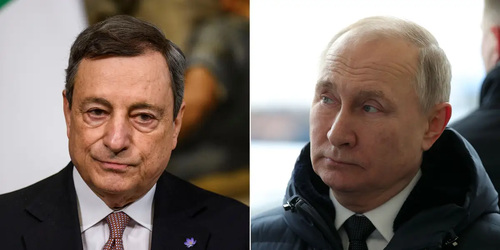
taly says it’s working to intervene diplomatically with Russia to allow Ukrainian ports to open amid a growing global wheat and food supply crisis, given some 30% of the world’s wheat comes from war-ravaged Ukraine and Russia.
This culminated in a Thursday phone call between Prime Minister Mario Draghi and Russian President Vladimir Putin, wherein the Italian leader is believed to have pressed Putin to order his military to unblock Black Sea ports.
A statement from the Kremlin following the call said “Vladimir Putin emphasizes that the Russian Federation is ready to make a significant contribution to overcoming the food crisis through the export of grain and fertilizer, subject to the lifting of politically motivated restrictions by the West.”
Putin’s office confirmed he spoke about “steps taken to ensure the safety of navigation, including the daily opening of humanitarian corridors for the exit of civilian ships from the ports of the Azov and the Black Sea, which is impeded by the Ukrainian side.”
Draghi’s office in turn described that “the call was dedicated to developments in Ukraine and efforts to find a common solution to the ongoing food crisis, as well as the severe repercussions for the world’s poorest countries.”
The United States and leaders of several European countries have blamed Russia for increasing world hunger and ratcheting food prices and lack of supply, which is impacting already struggling and poor countries the hardest. However, Putin said the accusations are “unfounded” – following Russian officials earlier blaming Ukraine’s military for deploying thousands of sea mines around its ports.
Russia has meanwhile stressed that its military is engaged in extensive and complex demining operations of mines placed by Ukrainian forces, making international shipping dangerous and impossible in some areas off Ukraine’s coast.
NATO in a message earlier this month warned all commercial traffic in the Black Sea of the growing danger of drifting mines as spillover from the Russia-Ukraine war.


